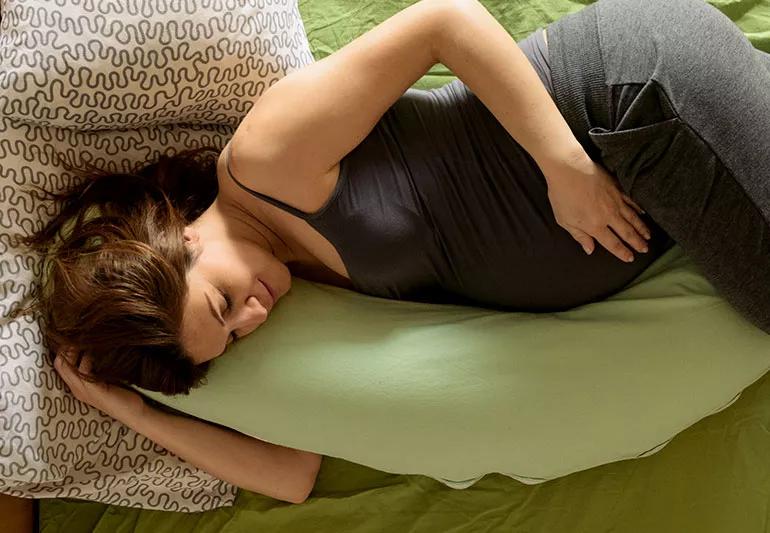Pregnant women lacking sleep more likely to have complications

Image content: This image is available to view online.
View image online (https://assets.clevelandclinic.org/transform/b01f15a7-0058-4538-936e-705b955d21a8/pregSleepHelp-653834402-770x553_jpg)
Pregnant woman sleeping on side with maternity pillow
Newborns have a certain reputation for keeping people up at odd hours with late-night feedings — but the sleepless nights can begin long before your baby arrives.
Advertisement
Cleveland Clinic is a non-profit academic medical center. Advertising on our site helps support our mission. We do not endorse non-Cleveland Clinic products or services. Policy
Figuring out how to get better sleep during pregnancy is not just important for your energy and mood. Pregnant women who get less sleep are more likely to have complications, according to sleep disorders specialist Sally Ibrahim, MD.
Find out what sleep disrupters are common throughout your pregnancy, as well as ways to get better rest.
First trimester: It's normal to crave a significant amount of sleep while the placenta grows. Don’t be surprised if you feel sleepier overall, need to go to bed earlier and take naps. At this stage, the best thing you can do is to give into this urge, and get the rest your body needs.
Second trimester: The amount of sleep normalizes to the amount you needed before your pregnancy. But, as the fetus and abdomen grow, there may be things that start to effect sleep, such as getting up and using the restroom.
Third trimester: Tiredness can come from poor quality sleep. You may get less quality sleep due to factors such as:
Although it’s impossible to avoid many of the things that limit sleep during pregnancy, there are ways to get more (and better) rest:
Advertisement
Sleep disorders may start or worsen during the course of pregnancy.
"You might not have these conditions before pregnancy, and they might develop during any trimester but especially by the end of pregnancy,” Dr. Ibrahim says.
Sleep problems during pregnancy are not inevitable. They can, and should be addressed.
Restless leg syndrome: If a woman has restless leg syndrome (RLS), it may get worse during pregnancy. The condition may also appear for the first time. Once RLS shows up, it is more likely to recur in later pregnancies. However, symptoms return to normal (for pre-existing cases) or disappear (for new cases) moments after delivery.
Sleep apnea: Sleep apnea is particularly dangerous when you're pregnant.
Research shows negative effects for both the mother and for fetal development. The full extent of the problem isn’t fully known yet, but there is substantial evidence pointing to the association of sleep apnea with:
Talk to your doctor if you continue to struggle to get enough sleep. They can help pinpoint the cause and offer more tips to overcome it.
Advertisement

Sign up for our Health Essentials emails for expert guidance on nutrition, fitness, sleep, skin care and more.
Learn more about our editorial process.
Advertisement
Most rashes aren’t dangerous — but it’s worth talking to your pregnancy provider about them
The best available evidence indicates that, used correctly, acetaminophen is safe to take throughout a pregnancy
Prenatal massage, done properly, is a safe and effective way to lower stress and relieve pregnancy discomforts
Avoid high-mercury fish and processed meat, and go easy on salt and caffeine
Unless your healthcare provider tells you otherwise, it’s typically considered safe to have sex during pregnancy
Hot tubs and saunas raise your body temperature and can pose risks
Baths can be safe if you turn down the temp, avoid irritating bath products and take extra precautions against
SSRIs are the safest antidepressants to take in pregnancy — and pose less risk than unmanaged depression
Prioritize your health by managing stress, strengthening your social connections and getting quality sleep
Bolsters, blankets, pillows and blocks can offer extra support, stability and comfort
Allergies, postnasal drip, asthma or reflux could be to blame for a cough that won’t quit